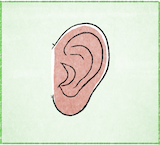
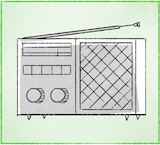
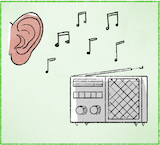
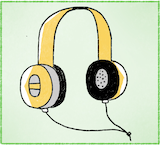
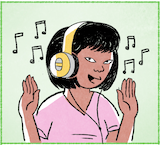
นี้คืออี่หยัง นี้คือหู
หูมันเป็นอี่หยัง หูมันเป็นอะวัยยะวะในล้างกายของเฮา
หูมันเอาไว้เฮ็ดหญัง หูมันเอาไว้ถ้าฟังเสียง ขั้นบ่มีหู กะสิบ่ได้ญินเสียง
หูมันอันใหญ่บ่ บ่ หูมันอันบ่ใหญ่
หูมันอยู่ส่วนใดในล้างกายของเฮา หูมันอยู่ข้างหัวของเฮาเทิงสองข้าง หูมันมีสองข้าง
หูมันแข็งบ่ บ่ หูมันบ่แข็ง หูมันอ่อนๆ หูมันบ่มีกะดูก
2
นี้คืออี่หยัง นี้คือวิทะยุ
วิทะยุมันเป็นแบบใด วิทะยุมันค้ายๆ กับโทละทัด แต่ว่าวิทะยุมันสิบ่มีพาบ
มันสิเป็นค้ายๆ กับโทละทัด มันสิบ่มีพาบให้เบิ่ง เปิดฟังแต่เสียงได้ซื่อๆ บ่สามาดเบิ่งพาบได้
ในวิทะยุมีอี่หยังแน่ ในวิทะยุกะสิมีลำโพง กะสิมีปุ่มเปิด กะสิมีปุ่มปิด
วิทะยุมีหลักอากาดบ่ มีอยู่ วิทะยุมีหลักอากาดอยู่
หลักอากาดมีไว้เฮ็ดหญัง หลักอากาดมีไว้ถ้าหาสันญาน หาคื้น ฟังเพง
ขั้นคื้นสันญานเพงบ่ดี กะสิฟังเพงบ่ได้
3
เขากำลังเฮ็ดหญัง เขากำลังฟังเพง
เขาฟังเพงอยู่ใส บ่ลู้คือกันว่าเขาฟังเพงอยู่ใส บ่ได้อยู่นำเขา
เขาฟังเพงจากใด เขาฟังเพงจากวิทะยุ เขาเปิดวิทะยุ และเขากะฟังเพงจากวิทะยุ
เขาใซ้อี่หยังฟังเพง เขาใซ้หูของเขาฟังเพง
เขาฟังเพงอี่หยัง บ่ลู้คือกันหละเนาะ จักว่าเขาฟังเพงอี่หยัง บ่ได้ฟังนำเขา
เขาเปิดวิทะยุจักเคี่ยง เขาเปิดวิทะยุเคี่ยงเดียว เขาฟังของเขาพุเดียว เขาเลยเปิดเคี่ยงเดียว
วิทะยุเคี่ยงสีหญัง วิทะยุเคี่ยงสีเทาๆ สีม่นๆ
วิทะยุเคี่ยงใหญ่บ่ บ่ วิทะยุเคี่ยงพอดี เคี่ยงพอเท่าๆ หนิ บ่เคี่ยงใหญ่หลาย
4
นี้คืออี่หยัง นี้คือหูฟัง
หูฟังเอาไว้เฮ็ดหญัง หูฟังเอาไว้ถ้าฟังเพง
หูฟังใส่หูได้จักข้าง หูฟังใส่หูได้สองข้าง
หูฟังสีอี่หยัง หูฟังสีเหลียง
หูฟังมีสายบ่ มีอยู่ หูฟังมีสาย
สายหูฟังเอาไว้เฮ็ดหญัง สายหูฟังเอาไว้ถ้าเสียบ ใส่โทละสับ หลือเสียบใส่ค็อม เพื่อที่เฮาสิสามาดฟังเพงได้
ขั้นบ่มีสาย มันกะบ่สามาดฟังเพงได้ เพาะว่ามันสิบ่สามาดเสียบเข้าไปในโทละสับ หลือบ่สามาดเสียบเข้าไปในค็อมได้
5
เขากำลังเฮ็ดหญัง เขากำลังฟังเพง
เขาฟังเพงจั่งใด เขาเสียบหูฟังใส่หูของเขา แล้วเขากะฟังเพง
เขาฟังเพงอี่หยัง บ่ลู้คือกันหละเนาะ จักเขาฟังเพงอี่หยัง บ่ได้ฟังนำเขา บ่ได้ญินนำเขา จักเขาฟังเพงอี่หยัง
เขาฟังเพงจักคน เขาฟังเพงพุเดียว
เขาเป็นพุหญิงหลือเป็นพุซาย เขาเป็นพุหญิง
เขาพุดีบ่ บ่ลู้คือกันจักพุดีหลือบ่พุดี เบิ่งบ่ออก
เขาญกมือขึ้นบ่ ญกมือขึ้นอยู่
เขาญกมือขึ้นจักข้าง เขาญกมือขึ้นสองข้าง
เขาญกมือขึ้นเฮ็ดหญัง บ่ลู้คือกัน เขาอาดสิฟังเพงม่วนหลาย เขากะเลยญกมือขึ้น เพื่อที่สิใซ้มือญ้อนเข้าไปนำเพง เพาะว่ามันอาดสิม่วนหลาย
Link to overview page
Link to dictionary
| Isaan | Pronunciation | Tones | Thai | English/Notes |
|---|---|---|---|---|
| นี้ | ni: | HF | นี้ | 1. this 2. here |
| คือ | khʉ: | HR | คือ | 1. to be, to resemble, like, as 2. why {บักหล้าคือบ่เก็บโต่ะแน่ = [addressing a young boy] Why haven't you cleared the table?} |
| อี่หยัง | i:-yaŋ | H-M | อะไร | 1. what {นี้คืออี่หยัง = What is this?} {มื้อนี้เจ้าเฮ็ดอี่หยัง = What are you doing today?} {กินเข้างายกับอี่หยัง = What did you have for breakfast?} 2. something, anything, (in negations) nothing {บ่ต้องเฮ็ดอี่หยังอีกเลยนอกจากใส่ปุย = [we] don't need to do anything besides adding fertilizer} |
| หู | hu: | M | หู | 1. ear 2. opening, hole, e.g., the hole a needle has to insert the thread 3. handle which has a hole, e.g., of a cup or pot |
| มัน | man | HR | มัน | it (also used to refer to people) |
| เป็น | pen | M | เป็น | 1. to be, to exist 2. to be able to 3. to suffer, sth. happens to 4. เป็นหญัง[...]คือ in initial position: why? {เป็นหญังเขากะคือแปงฟัน = Why is he brushing his teeth?} {เป็นหญังเคี่ยงบินมันคือสิตก = Why is the airplane falling down?} |
| อะวัยยะวะ | a-wai-ya-wa | M-HR-M-H | อวัยวะ | organ, body part |
| ใน | nai | HR | ใน | in, within |
| ล้างกาย | la:ŋ-ga:i | HF-M | ร่างกาย | body |
| ของ | khɔ:ŋ | M | ของ | of, belonging to |
| เฮา | hao | HR | เรา | 1. personal pronoun: we 2. personal pronoun: I |
| เอา | ao | M | เอา | to take, to give {เขากำลังเอาก่องไปซั่ง = he's taking the boxes to weigh them} {หมอกำลังเอายาให้คนป่วยกิน = the doctor is giving medicine to the patient} {เอาไว้ถ้า = is for, is used for, has the purpose of} |
| ไว้ | wai | HF | ไว้ | 1. to keep, to put, to place, to retain, to save, to reserve {เขาเอาหัวของเขาไว้ใส = Where does she put her head?} {หมาสิเลี้ยงไว้บ้าน = dogs are kept/raised in the house} {ไก่เลี้ยงไว้ในคอก = chicken are kept/raised in a coop} {หน้ามันบังไว้ = the face is covered/not visible} {เขาเอาโทละสับวางไว้หู = he holds the phone to his ear} 2. for {นาลิกาปุกมีไว้เฮ็ดหญัง = What is an alarm clock for?} {หม้อเอาไว้เฮ็ดแนวกิน = a pot is used to make food} {ก่องเอาไว้เฮ็ดหญัง ก่องเอาไว้ใส่ของ = What is the box for? It's for putting in stuff.} Notes: see also ไว้ถ้า |
| เฮ็ด | het | H | ทำ | to do, to make |
| หญัง | ɲaŋ | M | อะไร, เป็นหญัง = ทำไม | 1. what {เขากำลังเฮ็ดหญัง = What is he doing?} {ธูปเอาไว้เฮ็ดหญัง = What are incense sticks for?} 2. something, anything, (nothing) 3. เป็นหญัง[...]คือ in initial position: why {เป็นหญังเขาคือใส่บักพิกลงไปในกวยเตียว = Why is he putting chili in [his] noodle soup?} {เป็นหญังหน้าต่างมันคือเปิด = Why is the window open?} {เป็นหญังมันคือมีควนไฟ = Why is there smoke?} |
| ไว้ถ้า | wai-tha: | HF-LF | usually in a positive statement or answer: is for, is used for, has the purpose of {กะทะมีไว้ถ้าทอด = a pan is for frying} {น้ำบักนาวมีไว้ถ้าปุงอาหาน = lime juice is used to season food} {ปากกามีไว้ถ้าเขียน = a pen is for writing} {กะเทียมเอาไว้ถ้าเฮ็ดแนวกิน = garlic is used to make food} {ขาเอาไว้ถ้าญ่าง = legs are for walking} {เกิบเอาไว้ถ้าใส่ = shoes are for wearing} Notes: see also ไว้ |
|
| ฟัง | faŋ | HR | ฟัง | to listen, to hear |
| เสียง | si:aŋ | M | เสียง | 1. sound, noise 2. tone, voice |
| ขั้น | khan | LF | เมื่อ | when, if |
| บ่ | bɔ: | H | ไม่ | 1. no, not 2. question particle, transforming a statement into a question Notes: spelling exception in line with common usage on social media |
| มี | mi: | HR | มี | 1. to have 2. there is |
| กะ | ga | M | ก็ | 1. then, consequently 2. also |
| สิ | si | M | จะ | future tense auxiliary {เขากำลังสิตื่น = he's about to wake up} {สิไปตะหลาด = [I'm] going to the market} |
| ได้ญิน | dai-ɲin | HF-HR | ได้ยิน | to hear |
| อัน | an | M | อัน | 1. thing, object 2. general clf. for objects |
| ใหญ่ | ɲai | H | ใหญ่ | large, big |
| อยู่ | yu: | H | อยู่ | 1. to be (located) at 2. yet, still 3. auxiliary indicating continuous or progressive action {ทอดปาอยู่ในกะทะ = (in the process of) frying a fish in the pan} {แม่กำลังเมี้ยนเฮียนอยู่ = mother is cleaning/tidying up the house} |
| ส่วน | su:an | H | ส่วน | part, portion |
| ใด | dai | M | ใด | 1. which, that one which, what, how {เขานั่งแบบใด เขานั่งขดตะหมาดอยู่ = How is he sitting? He's sitting cross-legged.} {ตอนใด = when?} 2. whichever, whoever {หม้องใดหม้องหนึ่ง = some place, somewhere} {ขั้นเฮาอยากตื่นญามใด เฮากะตั้งเวลาปุกญามนั้น = If we want to get up at a certain time, we set the alarm to that time} Notes: sentence-final often with a marked rising tone |
| ข้าง | kha:ŋ | LF | ข้าง | 1. side {มีหูจับสองข้าง = there are handles on both sides} 2. next to {วางอยู่ข้างๆ ก่องใบใหญ่ = it's placed next to the large box} {เขายืนอยู่ข้างๆ อีกพุหนึ่ง = he's standing next to another person} 3. clf. for body parts which come in pairs (eyes, ears, legs etc.) {เขามีตาสองข้าง = she has two eyes} |
| หัว | hu:a | M | หัว | 1. head 2. clf. for onions, bulbs of garlic |
| เทิง | thə:ŋ | HR | ทั้ง | 1. up to, all, all of, the whole of, altogether {เขาใส่กางเกงขาสั้นเทิงสองคน = both are wearing short trousers} {เขาเป็นพ่อของลูกเทิงสามคนนี้ = he's the father of these three [children] here} 2. เทิง ... เทิง ...: both ... and ..., ... as well as ... {เทิงมีใบพ้อม เทิงมีเหลียนพ้อม = there are notes as well as coins} Notes: pronunciation: also realized as ทัง |
| สอง | sɔ:ŋ | M | สอง | two |
| แข็ง | khɛŋ | M | แข็ง | hard, strong |
| อ่อน | ɔ:n | H | อ่อน | 1. soft 2. young |
| กะดูก | ga-du:k | M-LF | กระดูก | bone |
| วิทะยุ | wi-tha-yu | H-H-H | วิทยุ | radio |
| แบบ | bɛ:p | LF | แบบ | 1. example, model, kind 2. style, form, pattern, design |
| ค้าย | kha:i | HF | คล้าย | to resemble, to be similar, to be alike {ทัพพีเป็นค้ายๆ กับซ้อน = a ladle is similar to a spoon} |
| กับ | gap | M | กับ | 1. and {ลุงกับป้า = uncle and aunt} {กวยเตียวหมูกับกวยเตียวไก่ = noodle soup with pork and noodle soup with chicken} 2. with, to {ค้ายๆ กับคำว่า ... = similar to the word ...} 3. prefix in front of foods {กับเข้า = side dishes eaten with rice} {เขากินกับกวยเตียว = he's eating noodle soup} |
| โทละทัด | tho-la-that | HR-H-H | โทรทัศน์ | TV Notes: pronunciation: also realized as โทระทัด |
| แต่ว่า | tɛ:-wa: | H-H | แต่ว่า | 1. but 2. only {ฮู้แต่ว่าเขายืนอยู่พุเดียว = I only know that he's standing there by himself} |
| พาบ | pha:p | HF | ภาพ | 1. picture, photo 2. clf. for pictures, photos |
| ให้ | hai | LF | ให้ | 1. to give {หมอกำลังเอายาให้คนป่วยกิน = the doctor is giving the patient medicine} 2. for 3. to allow, to be allowed |
| เบิ่ง | bəŋ | H | ดู | 1. to look at, to see, to watch {เบิ่งโทละทัด = to watch TV} {เบิ่งหนัง = to watch a movie} 2. to guess {เบิ่งซงแล้ว ... = [I] guess / from what it looks like ...} |
| เปิด | pə:t | M | เปิด | 1. to open {เปิดหน้าต่าง = to open the window} {เปิดปะตู = to open the door} 2. to start, to switch on {เปิดไฟ = to switch on the light} {เปิดแอ = to switch on the A/C} |
| แต่ | tɛ: | H | แต่ | 1. but {แต่บ่ต่างกันหลาย = but not very different} {แต่บ่ลู้ว่าเขาญ่างมาแต่ใส = but [I] don't know where he's coming from, see also: แต่ว่า} 2. only {ตอนนี้มีแต่ขี้ฝ้า = now there are only clouds} |
| ได้ | dai | HF | ได้ | 1. can 2. to get, to obtain 3. before verb: indicating past tense 4. บ่ได้ + verb: not |
| ซื่อๆ | sʉ: | H | เฉยๆ | 1. just so 2. so-so |
| สามาด | sa:-ma:t | M-HF | สามารถ | can, to be able |
| แน่ | nɛ: | H | แน่, บ้าง | 1. some, somewhat 2. final particle, used to ask for examples (similar to Thai บ้าง at the end of a question) {หม้อใซ้เฮ็ดอี่หยังได้แน่ = What (different things) can a pot be used for?} {น้ำอัดลมซื้อได้อยู่ใสแน่ = Where/in which places can one buy soft drinks?} 3. final particle, when giving examples {มีเทิงส้งแน่ มีเสี้ยแน่ มีเกิบแน่ = there are trousers, shirts, shoes etc.} 4. final particle, used to give a command {ไปปิดหน้าต่างให้แน่ = Close the window!} 5. final particle, acting as an intensifier, especially in the pattern ... คัก ... แน่ {สูงคักสูงแน่ = very high} {ญ้องเฮาคัก ญ้องเฮาแน่ = [he's] praising me a lot} |
| ลำโพง | lam-pho:ŋ | HR-HR | ลำโพง | loudspeaker |
| ปุ่ม | pum | H | ปุ่ม | button |
| ปิด | pit | M | ปิด | 1. to close {ปิดปะตู = to close the door} {ปิดก่อกน้ำ = to close the tap} 2. to finish, to switch off {ปิดไฟ = to switch off the light} {ปิดวิทะยุ = to switch off the radio} |
| หลักอากาด | lak-a:-ga:t | M-M-LF | สายอากาศ | antenna |
| หา | ha: | M | หา | to look for, to find |
| สันญาน | san-ɲa:n | M-HR | สัญญาณ | signal |
| คื้น | khʉ:n | HF | คลื่น | wave |
| เพง | phe:ŋ | HR | เพลง | 1. song 2. music |
| ดี | di: | M | ดี | good |
| เขา | khao | M | เขา | personal pronoun: he, she |
| กำลัง | gam-laŋ | M-HR | กำลัง | auxiliary indicating continuous or progressive action |
| ใส | sai | M | (ที่)ไหน | 1. where? {สิไปใส = Where are [you] going?} {มาแต่ใส = Where are [you] coming from?} {กะทะอยู่ใส = Where's the pan?} 2. somewhere, anywhere {ใสกะได้ = anywhere, wherever you like} |
| ลู้ | lu: | HF | รู้ | 1. to know 2. to understand Notes: equivalent to ฮู้ |
| คือกัน | khʉ:-gan | HR-M | เหมือนกัน | 1. also, likewise, similarly {ยินดีที่ได้ฮู้จักคือกันคับ = Nice to meet you too!} 2. in negative sentences: either {บ่ลู้คือกัน = I don't know either} {จักคือกัน = I don't know (either)} |
| ว่า | wa: | H | ว่า | 1. that, as {คำว่า X = the word X} 2. to say |
| นำ | nam | HR | 1. at, in 2. with, together with {บ่สามาดถือไปนำได้ = [you] can't carry it around} {กินบักแตงโมนำเฮาบ่ = Will you eat watermelon with me?} 3. to lead, to accompany, to go with {เด็กน้อยญ่างไปนำแม่ = the daughter follows her mother} |
|
| จาก | ja:k | LF | จาก | 1. from {... เฮ็ดมาจากอี่หยัง = ... is made from what?} 2. to depart |
| และ | lɛ | H | และ | and |
| ใซ้ | sai | HF | ใช้ | to use |
| หละ | la | M | แหละ, ล่ะ | 1. auxiliary for emphasis at the end of a phrase 2. auxiliary to create a follow-up question: And what about ... ? {แล้วลดคันที่สองหละ = And what about the second car?} |
| เนาะ | nɔ | H | เนาะ | final particle: makes the statement softer, looking for agreement |
| จัก | jak | M | จัก | 1. answer to a question: [I] don't know, don't know exactly, [I'm] not sure {พุซายคนนี้เขาเถ้าไป่ จัก จักเถ้าหลือบ่เถ้า เบิ่งบ่ค่อยออก = Is this man here already old? I don't know. I can't see clearly whether he's old or not.} {เขาเว้ากันอยู่ใส จักคือกัน = Where are they talking? I don't know either.} 2. exact(ly), what exactly {จักต้มอี่หยังกะบ่ฮู้ = I don't know what (exactly) he is cooking} {บ่ลู้คือกันจักปาอี่หยัง = I don't know either what kind of fish this is} 3. how much/many? {ต้นไม้มีจักต้น = How many trees are there?} {ตอนนี้จักโมงแล้ว = What time is it now?} {มือของเฮานี้สิมีจักนิ้ว = How many fingers do our hands have?} 4. a bit, a little bit {จักหน่อย/จักหน่อยหนึ่ง = a bit, a little bit} |
| เคี่ยง | khi:aŋ | H | เครื่อง | 1. machine, engine 2. clf. for machines, airplanes, electronic devices etc. Notes: pronunciation: also realized as เคื่อง |
| เดียว | di:ao | M | เดียว | only, alone, single |
| พุเดียว | phu-di:ao | H-M | คนเดียว | 1. alone, by oneself {เขากำลังยืนอยู่พุเดียว = she's standing by herself} {เขานั่งอยู่พุเดียว = he's sitting by himself} 2. one person |
| เลย | lə:i | HR | เลย | 1. futher on, beyond, past {เข็มน้อยเลยเลขสิบสองไป = the minute hand has passed number twelve} 2. too much 3. at all 4. definitively 5. completely, utterly |
| สี | si: | M | สี | 1. color 2. colored pencil, crayon |
| เทา | thao | HR | เทา | grey |
| ม่น | mon | H | เทา | grey |
| พอดี | phɔ:-di: | HR-M | พอดี | 1. to fit well 2. appropriate, just enough, just right {กะจกบานบ่ใหญ่ กะจกบานพอดี = not a large window, just right} {พอดีมือของเฮา = just right for his hand} 3. just in time, at the right moment, just this moment {แล้วพุซายคนนี้กะญ่างมาพอดี = and the man has come just now} |
| พอ | phɔ: | HR | พอ | 1. just when, just after, as soon as 2. enough, adequate |
| เท่า | thao | H | พอดี, ไม่ไหญ่มาก | 1. not too large, appropriate size {เคี่ยงพอเท่าๆ = appropriately/moderately sized device/machine} 2. this much, that much, however much {เท่านั้น เท่านี้ = that much, this much} |
| หนิ | ni | M | นี่แหละ, เหรอ/หรอ | 1. particle used to emphasize a statement or form (or add to) a question {เป็นตาแซบคือหญังหนิ = it's really tasty} {เคี่ยงพอเท่าๆ หนิ = the [radio] is appropriately sized (i.e., not too large)} 2. variant of นี้ = this Notes: translation to be determined; maybe sometimes like Thai นี่แหละ; other examples given: อยู่ใสหนิ อยู่ตลาดหนิ กินเข้าไป่หนิ |
| หลาย | la:i | M | เยอะ, มาก | many, much, very |
| หูฟัง | hu:-faŋ | M-HR | หูฟัง | headphones, earphones |
| ใส่ | sai | H | ใส่ | 1. to put something in/on {เขาใส่บักพิกในกวยเตียวหลาย = he's putting a lot of chili in his noodle soup} {เขาบีบยาสีฟันใส่แปงสีฟัน = he squeezes toothpaste on the toothbrush} {ก่องเอาไว้ใส่ของ = boxes are there to put stuff in} 2. to wear (clothes) {เขาใส่เสี้ยแขนญาว = he's wearing a long-sleeve} 3. directed at {เอิ้นใส่กัน = to call each other/to say to each other} {หมามันเห่าใส่แมว = the dog barks at the cat} {ล้องเพงใส่ไม = to sing into the microphone} {เขากำลังซี้มือไปใส่พุซาย = she's pointing at the man} |
| เหลียง | li:aŋ | M | เหลือง | yellow |
| สาย | sa:i | M | สาย | 1. string, thread, wire, cord {หูฟังมีสาย = the headphones have a cord} {สายไฟ = power cord} 2. clf. for rivers, bus lines, phone calls {แม่น้ำสายนี้ข้ามบ่ได้ = you can't cross this river} {มีสายเข้า = there's an incoming call} |
| เสียบ | si:ap | LF | เสียบ | to insert, to put in {เสียบปั่ก = to plug in} {ใซ้ซ้อนส้อมเสียบลูกซิ้น = to pick up meat balls with a fork} |
| โทละสับ | tho-la-sap | HR-H-M | โทรศัพท์ | phone Notes: pronunciation: also realized as โทระสับ |
| หลือ | lʉ: | M | หรือ | or |
| ค็อม | khom | HR | คอมพิวเตอร์ | computer |
| เพื่อที่ | phʉ:a-thi: | H-H | เพื่อที่ | in order to, so that Notes: the vowel เอือ is likely to be a Thai loan |
| เพาะว่า | phɔ-wa: | H-H | เพราะว่า | because |
| เข้า | khao | LF | เข้า | to enter, to go inside, to come/go in/on {เข้าห้องน้ำ = to go to the bathroom} {เข้านอน = to go to bed} {ขี่เลียเข้าไปเกาะ = to take a boat to go on an island} |
| ไป | pai | M | ไป | 1. to go 2. auxiliary indicating action extending into the future |
| จั่งใด | jaŋ-dai | H-M | ยังไง, แบบไหน | how, in what manner {บักนาวมันมีลดซาดจั่งใด = Lime fruits have what kind of taste?} {เขาปิดแอจั่งใด = How is he switching off the A/C?} {เทียนใซ้จั่งใด = How's a candle used?} {สิใซ้จั่งใด = how is [it] used?} |
| แล้ว | lɛ:o | HF | แล้ว | 1. finished 2. already 3. and then, and next (especially แล้วกะ) 4. auxiliary for past tense |
| คน | khon | HR | คน | person, people |
| พุหญิง | phu-ɲiŋ | H-M | ผู้หญิง | woman, female |
| พุซาย | phu-sa:i | H-HR | ผู้ชาย | man, male |
| พุ | phu | H | ผู้ | 1. person 2. clf. for people {พุหญิงพุหนึ่ง พุซายพุหนึ่ง = a woman, a man} {ซู่พุซู่คน = everybody} {พุหนึ่งโตจ่อยๆ พุหนึ่งโตบักอ้วนหนึ่ง = one person is slim, the other is fat} Notes: pronunciation: also realized as พู่- |
| ออก | ɔ:k | LF | ออก | 1. to go out, to leave 2. out |
| ญก | ɲok | H | ยก | 1. to raise {ญกมือขึ้น = to raise the hand} {ญกโตอย่าง = to give an example} 2. to lift {เขากำลังญกก้อนหินขึ้น = he's lifting up the stone} |
| มือ | mʉ: | HR | มือ | 1. hand 2. front leg/paw (e.g., of a cat) |
| ขึ้น | khʉn | LF | ขึ้น | 1. to go up, to increase 2. sun: to rise {ตะเว็นกำลังขึ้น = the sun is rising} 3. more 4. bus/train etc.: to get on, to board {พุโดยสานขึ้นลดไฟเบิดแล้ว = all passengers have boarded the train} |
| อาด | a:t | LF | อาจ | 1. might, may, will 2. likely |
| ม่วน | mu:an | H | สนุก, ม่วน | happy, amusing, fun |
| ญ้อน | ɲɔ:n | HF | เพราะ | 1. with the aid of {เขาปิดโทละทัดญ้อนลีโหมด = he uses the remote to switch off the TV} {เขาแปงฟันญ้อนยาสีฟัน = he brushes his teeth with/using toothpaste} 2. because, because of {เป็นหญังมันคือสิละลาย กะญ้อนว่ามันฮ้อน = Why is [the ice cream] melting? Because it's hot!} |